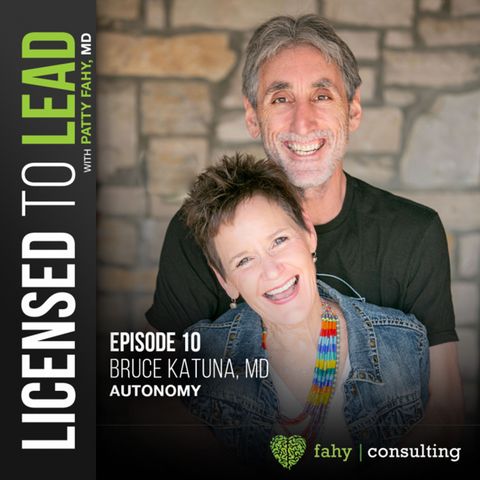010 - AUTONOMY: with guest Bruce Katuna, MD

Oct 6, 2020 ·
1h 3m 19s
In this conversation about the neuroscience of autonomy, I roped neurologist and neurophysiologist Bruce Katuna into joining me. It wasn’t a tough sell since he’d already joined me in holy...
show more
In this conversation about the neuroscience of autonomy, I roped neurologist and neurophysiologist Bruce Katuna into joining me. It wasn’t a tough sell since he’d already joined me in holy matrimony a few decades ago. My colleague, Lynn Elliott, agreed to facilitate the conversation and help us bring to life the importance and the nature of our primitive human drive for autonomy. The headline for this podcast is the central role of autonomy in the profession of medicine.
We dive into the neuroscience of autonomy and the effect on the prefrontal cortex (PFC) when autonomy is threatened.
I introduce the CARB model of interpersonal motivators. These four motivators, Clarity, Autonomy, Respect, and Belonging, are primitive drives which can activate the reward center when satisfied, and trigger the amygdala when threatened. So when autonomy is threatened—when we are not able to act based on our best judgment in a situation that is important to us—a threat state is triggered. And here’s the deal. A threat state diverts resources away from the prefrontal cortex and into survival behaviors like running away, fighting, or hiding.
Bruce, Lynn, and I don’t spend any time debating whether it’s better for a physician to be in a fight or flight threat state at work vs. having access to that human supercomputer, the PFC. We all agree that the PFC needs to be enabled, not hijacked, for physicians to function at their best. The PFC is the part of the brain used for advanced cognition: analyzing, deciding, understanding, recalling, prioritizing, etc.
We talk about other connections between autonomy and the current state of the medical profession: the type of leaders who preserve autonomy; physician autonomy as a necessity in fulfilling professional obligations to patients; and the connection between an autonomy deficit and the extraordinary rates of burnout and moral injury among physicians.
We hash over examples of autonomy and lack of autonomy in our own medical practices and we talk about some of the data and literature related to this basic human need. I hope we disabuse anyone of the notion that autonomy is code for “a physician’s tyrannical need to control.”
How do we assure patients that their physicians have professional autonomy and can fulfill their fiduciary role for patients? We discuss several options for getting back on track, and— spoiler alert—at the core is physician leadership.
Listen for a little homage to Janis Joplin and most of all don’t miss this headline:
A physician’s authority must be commensurate with their level of responsibility for achieving patient outcomes.
Sign up for our newsletter: https://bit.ly/LicensedToLeadSignup
show less
We dive into the neuroscience of autonomy and the effect on the prefrontal cortex (PFC) when autonomy is threatened.
I introduce the CARB model of interpersonal motivators. These four motivators, Clarity, Autonomy, Respect, and Belonging, are primitive drives which can activate the reward center when satisfied, and trigger the amygdala when threatened. So when autonomy is threatened—when we are not able to act based on our best judgment in a situation that is important to us—a threat state is triggered. And here’s the deal. A threat state diverts resources away from the prefrontal cortex and into survival behaviors like running away, fighting, or hiding.
Bruce, Lynn, and I don’t spend any time debating whether it’s better for a physician to be in a fight or flight threat state at work vs. having access to that human supercomputer, the PFC. We all agree that the PFC needs to be enabled, not hijacked, for physicians to function at their best. The PFC is the part of the brain used for advanced cognition: analyzing, deciding, understanding, recalling, prioritizing, etc.
We talk about other connections between autonomy and the current state of the medical profession: the type of leaders who preserve autonomy; physician autonomy as a necessity in fulfilling professional obligations to patients; and the connection between an autonomy deficit and the extraordinary rates of burnout and moral injury among physicians.
We hash over examples of autonomy and lack of autonomy in our own medical practices and we talk about some of the data and literature related to this basic human need. I hope we disabuse anyone of the notion that autonomy is code for “a physician’s tyrannical need to control.”
How do we assure patients that their physicians have professional autonomy and can fulfill their fiduciary role for patients? We discuss several options for getting back on track, and— spoiler alert—at the core is physician leadership.
Listen for a little homage to Janis Joplin and most of all don’t miss this headline:
A physician’s authority must be commensurate with their level of responsibility for achieving patient outcomes.
Sign up for our newsletter: https://bit.ly/LicensedToLeadSignup
Information
| Author | Patty Fahy, MD |
| Website | - |
| Tags |
Copyright 2024 - Spreaker Inc. an iHeartMedia Company
